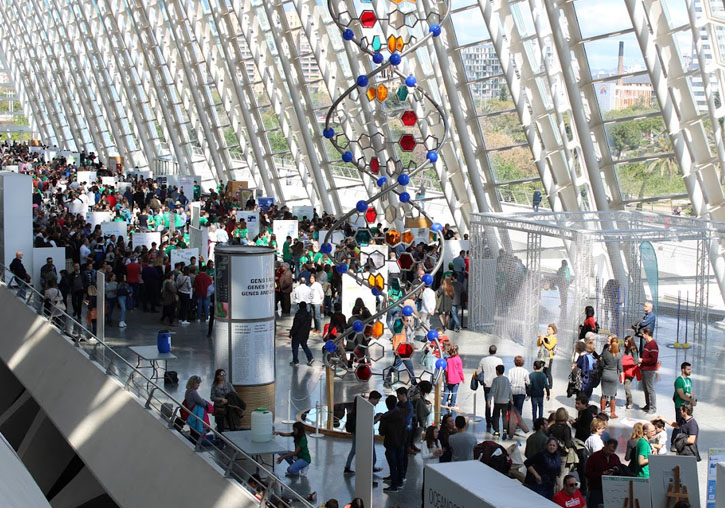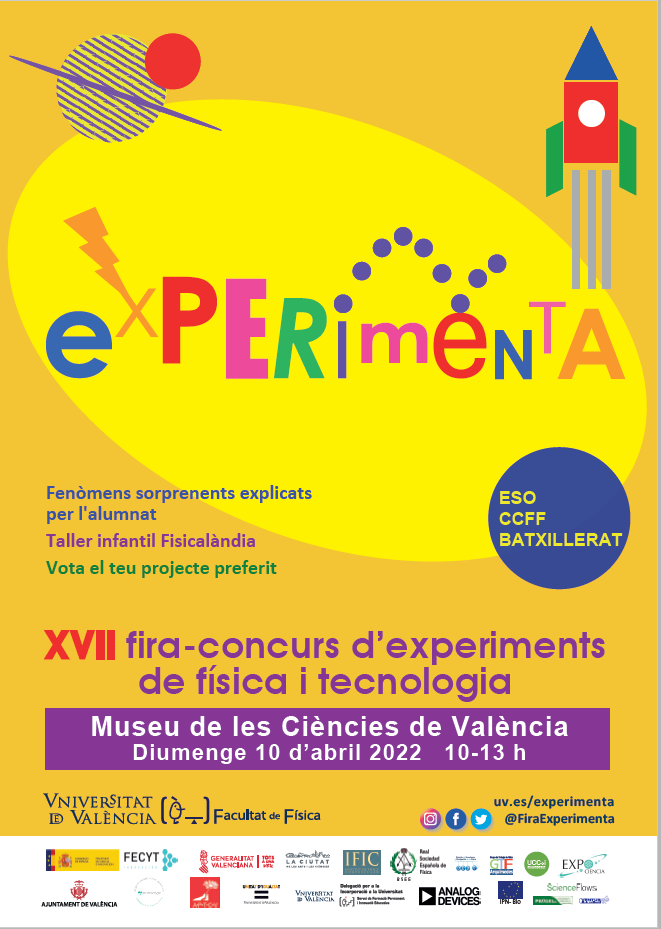
The Science Museum in Valencia is once again hosting the 17th Experimenta Fair-Contest of Physics and Technology Experiments and Demonstrations on Sunday 10th April between 10 a.m. and 1 p.m. The event, organised by the Faculty of Physics of the Universitat de València, is a science event that brings physics and technology closer to secondary school students and the general public in a creative and participatory way.
The Experimenta fair-contest, which has the collaboration of the Spanish Foundation for Science and Technology of the Ministry of Science and Innovation, among other entities, will bring together 270 participants, including students and teachers. Open to all visitors, it will host 68 stands, with different experimental STEM projects built by students from secondary school, bachillerato and education cycles, with the help of the teachers who will be tutoring them. The public will be able to ask questions about how any of the experiments work. At the same time, children will be able to visit the Fisicalandia workshop, where they will be able to build and understand simple demonstrations based on natural phenomena.
Experimenta, in addition to the fair, includes a contest in which prizes are awarded to the best projects, including the one with the most votes from the public. A jury made up of university and secondary school teachers will assess how well the projects work, how well they are understood and the clarity of the explanations. There will be five prizes: four of 300 euros for each category of the competition according to the cycle of studies, and one of 200 euros for the project with the most votes from the public visiting the fair, as well as various honourable mentions. These prizes will be awarded at a ceremony between 13.30 and 14.30 in the Santiago Grisolía Auditorium, which will be preceded by the short scientific interlude "Primary colours" by three students from the Degree in Physics of the Photonets group.
In the explanations, students (individually or in groups of up to four people) have to highlight the connections between natural phenomena and technological applications, i.e. between physics and technology. The works are classified into two thematic categories: on the one hand, physics demonstrations and experiments and, on the other, technological applications projects. These are subdivided into two depending on the educational cycle (ESO and Bachillerato/Educational Cycles).
The coordinator of Experimenta is Chantal Ferrer Roca, professor of the Department of Applied Physics and Electromagnetism of the Universitat de València, and the organising committee is also formed by the professors Jordi Vidal Perona, dean of the Faculty, Miguel V. Andrés Bou and Amparo Pons Martí.
"After two years in which a great effort has been made for this fair to go ahead, adapted to the health measures due to the pandemic and semi-presential in 2021, it is now returning to full presentiality, as we experienced it until 2019", explains Ferrer. "New developments include the fact that women make up 57% of the participants presenting experimental STEM projects. Furthermore, we have a large number of collaborators (70), volunteer students from the Faculty of Physics and a jury made up of 30 people, both University and secondary school teachers. Again, half of them are women," says Ferrer. Schools from Valencia, the Valencian Community and other provinces are taking part, and there are even groups from Belgium, Italy, Latvia, Portugal, belonging to the Erasmus+ network "Science is all around".
Among the personalities expected to attend that day are the regional secretary of Education and Vocational Training, Miguel Soler; the Vice-Rector for Studies at the University of Valencia, Isabel Vázquez; the CAC general director, Antonio Torres; the vice-president of the Royal Spanish Society of Physics, Elena Pinilla; the director of the Institute of Corpuscular Physics (CSIC-UV), Nuria Rius; the dean of the Faculty of Physics of the UV, Jordi Vidal; as well as the president of the Association of Technology Teachers of the Valencian Community, Sergi Serrano.
This initiative has a competitive project of the Spanish Foundation for Science and Technology of the Ministry of Science and Innovation (FECYT-MICINN), in addition to the collaboration of other entities, such as the Science Museum of Valencia, the Valencia City Council and the Royal Spanish Physics Society.
On the part of the Universitat, it is supported by the Institute of Corpuscular Physics (IFIC), the Scientific Culture and Innovation Unit (UCC+i), the Delegation for Incorporation to the UV, the Sanchis Guarner Training and Quality Centre, the Equality Unit, the Archimedes Physics Working Group, the ScienceFlows Group, as well as several external entities.
More information about Experimenta:
https://ir.uv.es/experimenta/feria
https://ir.uv.es/experimenta/fira
Images:




